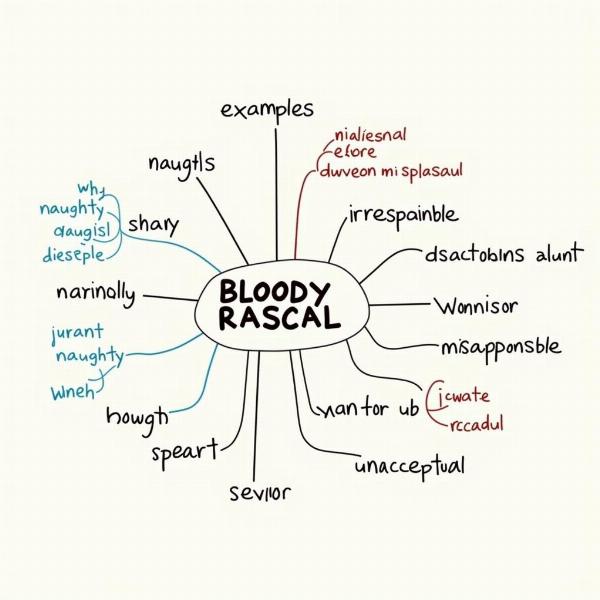Understanding the nuances of Hindi insults can be tricky. “Bloody rascal” is a common English phrase expressing anger and frustration, but what does it truly mean in Hindi, and how is it used in different contexts? This article explores the various Hindi translations of “bloody rascal,” their cultural implications, and appropriate usage.
Decoding “Bloody Rascal” in Hindi
“Bloody rascal” doesn’t have a single, perfect equivalent in Hindi. The meaning and intensity can vary depending on the context and the relationship between the speaker and the target. Several Hindi phrases capture the essence of this insult, ranging from playful teasing to outright condemnation.
Common Hindi Translations
Here are some common Hindi translations for “bloody rascal”:
- बदमाश (badmaash): This is perhaps the most common and versatile translation. It implies mischievousness, roguishness, and general disregard for rules. It can be used playfully or seriously.
- हरामखोर (haraamkhor): This is a much stronger and more offensive term. It literally means “one who eats forbidden things” and implies dishonesty and wickedness. Use this translation with extreme caution.
- कमीना (kameena): Similar to “haraamkhor,” this is a highly offensive term implying a low and despicable character. Avoid using this word in polite company.
- नालायक (nalayak): This word translates to “worthless” or “good-for-nothing.” It expresses disappointment and disapproval of someone’s actions.
- शैतान (shaitaan): Meaning “devil” or “mischievous,” this term can be used playfully to describe someone who is naughty or troublesome, or more seriously to describe someone malicious.
Cultural Context and Usage
Understanding the cultural context is crucial when using these translations. While “badmaash” can be used playfully among friends, words like “haraamkhor” and “kameena” carry a significant cultural weight and can be deeply offensive. Consider your relationship with the person you’re addressing and the overall situation before using these terms.
When to Use Which Translation
- Informal settings with friends: “Badmaash” or “shaitaan” might be appropriate for lighthearted teasing.
- Expressing frustration with a family member: “Nalayak” could be used to express disappointment, although caution is advised.
- Serious confrontations: Avoid using highly offensive terms like “haraamkhor” or “kameena” as they can escalate the situation.
Avoiding Misunderstandings
To avoid misunderstandings, it’s best to stick with less offensive terms like “badmaash” or “nalayak” unless you’re very close to the person you’re talking to. Even then, consider the tone of your voice and body language to ensure your message is received as intended.
Alternatives to “Bloody Rascal”
Consider using less aggressive alternatives like “naughty,” “mischievous,” or “irresponsible” when speaking English to avoid the need for potentially offensive translations.
 Alternatives to "Bloody Rascal"
Alternatives to "Bloody Rascal"
Conclusion: Choosing the Right Words
While “bloody rascal” seems like a simple phrase, its meaning in Hindi can be complex and nuanced. Choosing the appropriate translation depends on the context, your relationship with the other person, and the overall message you want to convey. By understanding the cultural implications of these words, you can avoid misunderstandings and communicate effectively. Remember to prioritize respectful and considerate language.
FAQ
-
What is the most common Hindi translation for “bloody rascal”? Badmaash is generally the most common and versatile translation.
-
Is it okay to use “haraamkhor” with friends? No, “haraamkhor” is a highly offensive term and should be avoided.
-
What are some less offensive alternatives in Hindi? Nalayak or badmaash are less offensive options, depending on the context.
-
What should I consider before using these translations? Consider your relationship with the person, the context of the conversation, and the overall message you want to convey.
-
What are some English alternatives to “bloody rascal”? “Naughty,” “mischievous,” or “irresponsible” are less aggressive alternatives.
-
Why is understanding cultural context important? Cultural context helps you choose the right words and avoid causing offense.
-
What is the safest way to avoid miscommunication? Use less offensive terms and be mindful of your tone and body language.
Meaning-Hindi.in is your trusted partner for accurate and culturally sensitive Hindi translation services. We specialize in Business & Commercial, Legal, Technical, Website Localization, Educational, and Urgent translations. Our expert linguists ensure your message is conveyed effectively while respecting cultural nuances. Contact us today for a free quote! Email: [email protected], Phone: +91 11-4502-7584. Meaning-Hindi.in is committed to delivering high-quality translations that bridge language barriers and foster clear communication.